"My Life Was Defined by Space Activity."
The Agony Column for May 24, 2002
Commentary by Rick Kleffel
Guest Writer, William H. Mook
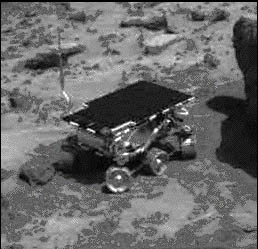
|
|
The Mars Rover images brought back powerful memories
of past space triumphs. Is space travel primarily in our
past?
|
Space travel is typically associated with the future, not the
past. For most who give it a thought, it's the object of hope, not
nostalgia. It's in the realm of science, not emotions.
But for a growing number of people, space travel does have
emotional ties. I must admit that when the Mars rover pictures came
back, I was practically in tears. I was glued to the NASA channel for
nearly three days. It took me back to the times when I was eight,
nine, twelve -- building models of the Mercury, then the Gemini, then
the Apollo spaceships. The rover transmissions made me long for those
days again, when there was always a new goal in space, and a new plan
to reach the goal, and we moved fast to get there.
Apparently, I'm not alone in this. A number of people had an
almost electric reaction to the review of 'Project
Orion: The True Story of the Atomic Spaceship', by George Dyson.
Still, I didn't expect anything like the reaction of William H. Mook,
from space.com. I found it really striking, and asked permission to
publish it. He replied to a post I made in the Usenet Newsgroup
rec.arts.sf.written. The only changes made to Mr. Mook's reply were
the deletion of some extra spaces, and the insertion of some extra
paragraphs. I've also undertaken to illustrate the work in my usual
fashion. Seeing those old model kits, as it happens, really got to
me.
Thanks,
Rick Kleffel
From: William Mook
(whmook@space.com)
Subject: Re: Project Orion: The True Story of
the Atomic Spaceship at The Agony Column
Newsgroups: rec.arts.horror.written,
rec.arts.sf.written, rec.arts.books, alt.horror
Date: 2002-05-14 23:01:49 PST
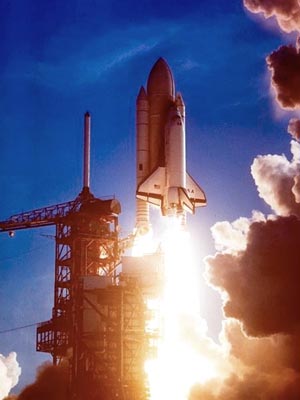
|
|
Is this the best way to get the human race into space?
Project Orion had a different idea. --Rickk
|
My life was defined by space activity.

|
|
This metal ball terrified nations and armies.
--Rickk
|
I was four years old when Sputnik 1 first orbited the Earth.
Throughout my childhood, and early school years space travel imbued
everything.
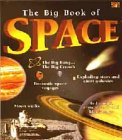
|
|
How many lives were changed by books like this?
--Rickk
|
I recall fondly the BIG BOOK OF SPACE my Grandmother gave me one
Christmas. In grade school we ducked beneath our seats to protect
ourselves from Atom bombs, and later, were called to the gymnasium to
see Ranger impact on the moon. What were these rockets at once so
terrible yet so wonderful? The horror of the Apollo 1 fire greeted my
middle school years. The beauty of Apollo 8 orbiting the moon at
Christmas began my high school years.
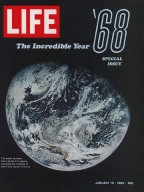
|
|
I collected these magazines, cut out the pictures and
hung them on my wall. --Rickk
|
The following May, the picture of Earth alone and vulnerable in
space, emblazoned the new Flag of Earth - on the first Earth day I
recall. A new idea was released in the world, about the world and a
new political movement started. My grandfather, who ran a small
construction firm, noted that that year was the year bomb shelter
sales stopped. The picture of Earth in space changed something, we
didn't know what. To me it was terribly exciting.
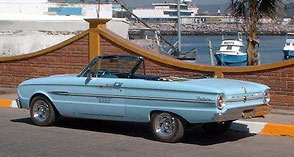
|
|
The mind boggles -- I was able to find an image of Mr.
Mook's first car -- in the correct color in cyberspace. That
seems to be the primary area of exploration for the 21st
century. --Rickk
|
The summer of 1969 was the year I bought a robin's egg blue 1963
Falcon convertible with small block V8 engine for $200. I recall
driving top down late that hot summer evening when Neil Armstrong
landed on the full moon my car only a few weeks old. I got a copy of
the New York Academy's THE FUTURE OF SPACEFLIGHT: The Next 25 Years,
1968 to 1993 from my dad. He knew I was interested in space, and he
supported my enthusiasm. I read it avidly.
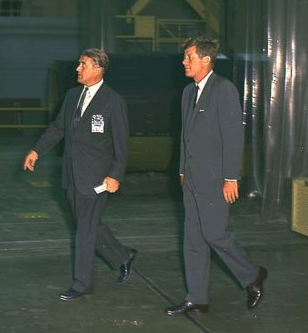
|
|
Werner Von Braun gives JFK a tour of NASA. --
Rickk
|
Von Braun, Erich, all the great rocket scientist of the day made
detailed technical descriptions of what was going to happen in the
future of aerospace. So, when I graduated high school, I elected to
become an Aerospace Engineer. I recall in my freshman physics class
the thrill that went through the assembled classroom as the ancient
professor who could remember Lindbergh like it was yesterday, spoke
of Newtonian forces and Kelplerian trajectories. "Imagine an object
projected from the surface of the Earth at 10.85 km/sec directed at
the moon.." Then he turned and was silent for a moment. "That's local
travel nowadays!" We all laughed. The future was going to be
great.
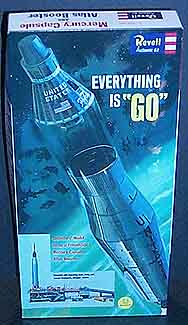
|
|
I built this model and many others like it.
--Rickk
|
The moment I decided to be a rocket man and join the great
movement to the stars that permeated my childhood, the moment I
realized I could comprehend all the engineering and physics involved,
it seemed that the entire world went through a major shift. We
weren't going to the stars. We were going to Vietnam instead. War was
brought to every living room in living color by satellite. Later even
that would change as the military decided to limit access to the
front by reporters and censor all reporting from future warzones.
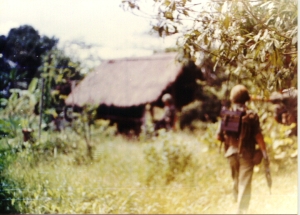
|
|
I sat at home eating TV dinners and watching images
such as these on the nightly news. --Rickk
|
I persevered and obtained the training I sought. Apollo was
cancelled when I was finished at school. I could build bombs at
McDonnell Douglas, I could build air to air missiles at Lockheed.
But, nowhere could I build spaceships. I ended up using Navier Stokes
equations to predict air pollution transport for the Federal EPA,
figuring if the government ever changed its mind about spaceships,
I'd be there. Later, I invented a new kind of lab instrument, and
started my own company. I'm still a member of AIAA, but I've never
built anything more than a model rocket.

|
|
How many lives could be changed by books like this?
--Rickk
|
Still, in reading PROJECT ORION, I am filled with remorse about
what could have been. Bertram Freeman's plan to visit Mars in October
1960 could have been carried forth. A small fleet of 150 foot
diameter, 4,000 ton Orion class spaceships would have changed
everything - and been right on time as far as I'm concerned.
That early success could have been followed by building 600 or so
Super Orion class spaceships. These 1,200 foot diameter, 4,000,000
ton superships would carry 1,500,000 tons throughout the solar
system. Along with this fleet of superships, would also be built
thousands of smaller Orion class ships, some of which would be
carried aboard the larger ships as ship tenders.
With these ships we could have made industrial use of solar system
resources, moved large populations off world, and reduced our impact
on Mother Earth, expanding upon the idea released by Apollo
pictures.

|
|
In an alternate history, we are roving the Solar
System in nuclear powered spaceships such as these. --
Rickk
|
The cost of the Mars trip would have been less than Apollo. The
cost of the fleet buildout would have been less than the Vietnam
War.
The cost of transport with this fleet would have been only a
nickel a pound aboard these ships. That's because the cost of a
kiloton of explosive power only costs about 40 cents.
These would have given America's youth, and the youth of the world
in 1960s a future worthy of the rhetoric and propaganda of that era.
It would have fulfilled every dream inspired by Kennedy's speeches
about sailing the vast new ocean of space.
But, the idea was killed, along with the young President, never to
be reborn.
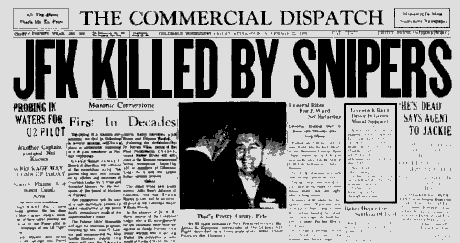
|
|
"It would have fulfilled every dream inspired by
Kennedy's speeches about sailing the vast new ocean of
space." -- William Mook
|











